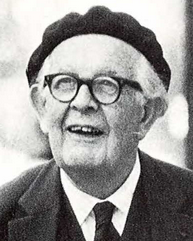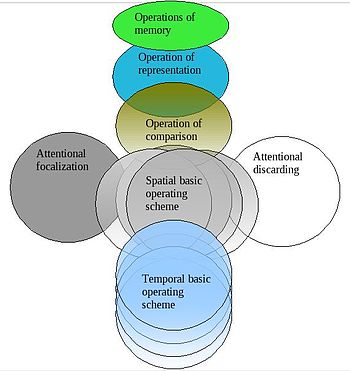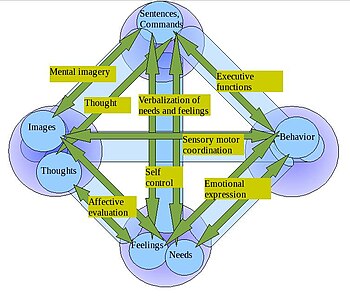
Cognitive psychology is the scientific study of mental processes such as attention, language use, memory, perception, problem solving, creativity, and reasoning.

In their most common sense, the terms thought and thinking refer to conscious cognitive processes that can happen independently of sensory stimulation. Their most paradigmatic forms are judging, reasoning, concept formation, problem solving, and deliberation. But other mental processes, like considering an idea, memory, or imagination, are also often included. These processes can happen internally independent of the sensory organs, unlike perception. But when understood in the widest sense, any mental event may be understood as a form of thinking, including perception and unconscious mental processes. In a slightly different sense, the term thought refers not to the mental processes themselves but to mental states or systems of ideas brought about by these processes.

Reason is the capacity of applying logic consciously by drawing conclusions from new or existing information, with the aim of seeking the truth. It is closely associated with such characteristically human activities as philosophy, science, language, mathematics, and art, and is normally considered to be a distinguishing ability possessed by humans. Reason is sometimes referred to as rationality.

Jean William Fritz Piaget was a Swiss psychologist known for his work on child development. Piaget's theory of cognitive development and epistemological view are together called "genetic epistemology".

In the study of the human mind, intellect is the ability of the human mind to reach correct conclusions about what is true and what is false in reality; and how to solve problems. Translated from the Ancient Greek philosophical concept nous, intellect derived from the Latin intelligere, from which the term intelligence in the French and English languages is also derived. The discussion of intellect can be divided into two areas that concern the relation between intelligence and intellect.
Joy Paul Guilford was an American psychologist best remembered for his psychometric study of human intelligence, including the distinction between convergent and divergent production.
The concepts of fluid intelligence (gf) and crystallized intelligence (gc) were introduced in 1963 by the psychologist Raymond Cattell. According to Cattell's psychometrically-based theory, general intelligence (g) is subdivided into gf and gc. Fluid intelligence is the ability to solve novel reasoning problems and is correlated with a number of important skills such as comprehension, problem-solving, and learning. Crystallized intelligence, on the other hand, involves the ability to deduce secondary relational abstractions by applying previously learned primary relational abstractions.

Piaget's theory of cognitive development is a comprehensive theory about the nature and development of human intelligence. It was originated by the Swiss developmental psychologist Jean Piaget (1896–1980). The theory deals with the nature of knowledge itself and how humans gradually come to acquire, construct, and use it. Piaget's theory is mainly known as a developmental stage theory.
Cognitive development is a field of study in neuroscience and psychology focusing on a child's development in terms of information processing, conceptual resources, perceptual skill, language learning, and other aspects of the developed adult brain and cognitive psychology. Qualitative differences between how a child processes their waking experience and how an adult processes their waking experience are acknowledged. Cognitive development is defined as the emergence of the ability to consciously cognize, understand, and articulate their understanding in adult terms. Cognitive development is how a person perceives, thinks, and gains understanding of their world through the relations of genetic and learning factors. There are four stages to cognitive information development. They are, reasoning, intelligence, language, and memory. These stages start when the baby is about 18 months old, they play with toys, listen to their parents speak, they watch tv, anything that catches their attention helps build their cognitive development.
In psychology, centration is the tendency to focus on one salient aspect of a situation and neglect other, possibly relevant aspects. Introduced by the Swiss psychologist Jean Piaget through his cognitive-developmental stage theory, centration is a behaviour often demonstrated in the preoperational stage. Piaget claimed that egocentrism, a common element responsible for preoperational children's unsystematic thinking, was causal to centration. Research on centration has primarily been made by Piaget, shown through his conservation tasks, while contemporary researchers have expanded on his ideas.

The three-stratum theory is a theory of cognitive ability proposed by the American psychologist John Carroll in 1993. It is based on a factor-analytic study of the correlation of individual-difference variables from data such as psychological tests, school marks and competence ratings from more than 460 datasets. These analyses suggested a three-layered model where each layer accounts for the variations in the correlations within the previous layer.

Evolutionary educational psychology is the study of the relation between inherent folk knowledge and abilities and accompanying inferential and attributional biases as these influence academic learning in evolutionarily novel cultural contexts, such as schools and the industrial workplace. The fundamental premises and principles of this discipline are presented below.

The following outline is provided as an overview of and topical guide to thought (thinking):
Mary Nacol Meeker (1921–2003), was an American educational psychologist and entrepreneur. She is best known for her applying J. P. Guilford's Structure of Intellect theory of human intelligence to the field of education.
Domain-general learning theories of development suggest that humans are born with mechanisms in the brain that exist to support and guide learning on a broad level, regardless of the type of information being learned. Domain-general learning theories also recognize that although learning different types of new information may be processed in the same way and in the same areas of the brain, different domains also function interdependently. Because these generalized domains work together, skills developed from one learned activity may translate into benefits with skills not yet learned. Another facet of domain-general learning theories is that knowledge within domains is cumulative, and builds under these domains over time to contribute to our greater knowledge structure. Psychologists whose theories align with domain-general framework include developmental psychologist Jean Piaget, who theorized that people develop a global knowledge structure which contains cohesive, whole knowledge internalized from experience, and psychologist Charles Spearman, whose work led to a theory on the existence of a single factor accounting for all general cognitive ability.

The psychology of reasoning is the study of how people reason, often broadly defined as the process of drawing conclusions to inform how people solve problems and make decisions. It overlaps with psychology, philosophy, linguistics, cognitive science, artificial intelligence, logic, and probability theory.

Neo-Piagetian theories of cognitive development criticize and build upon Jean Piaget's theory of cognitive development.
Spatial intelligence is an area in the theory of multiple intelligences that deals with spatial judgment and the ability to visualize with the mind's eye. It is defined by Howard Gardner as a human computational capacity that provides the ability or mental skill to solve spatial problems of navigation, visualization of objects from different angles and space, faces or scenes recognition, or to notice fine details. Gardner further explains that Spatial Intelligence could be more effective to solve problems in areas related to realistic, thing-oriented, and investigative occupations. This capability is a brain skill that is also found in people with visual impairment. As researched by Gardner, a blind person can recognize shapes in a non-visual way. The spatial reasoning of the blind person allows them to translate tactile sensations into mental calculations of length and visualizations of form.
The following outline is provided as an overview of and topical guide to human intelligence:
Jack Dunham was an American psychologist.












